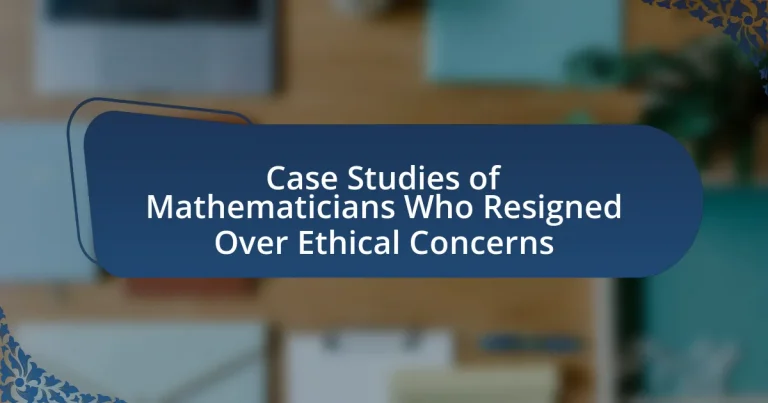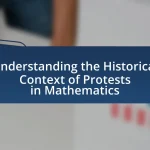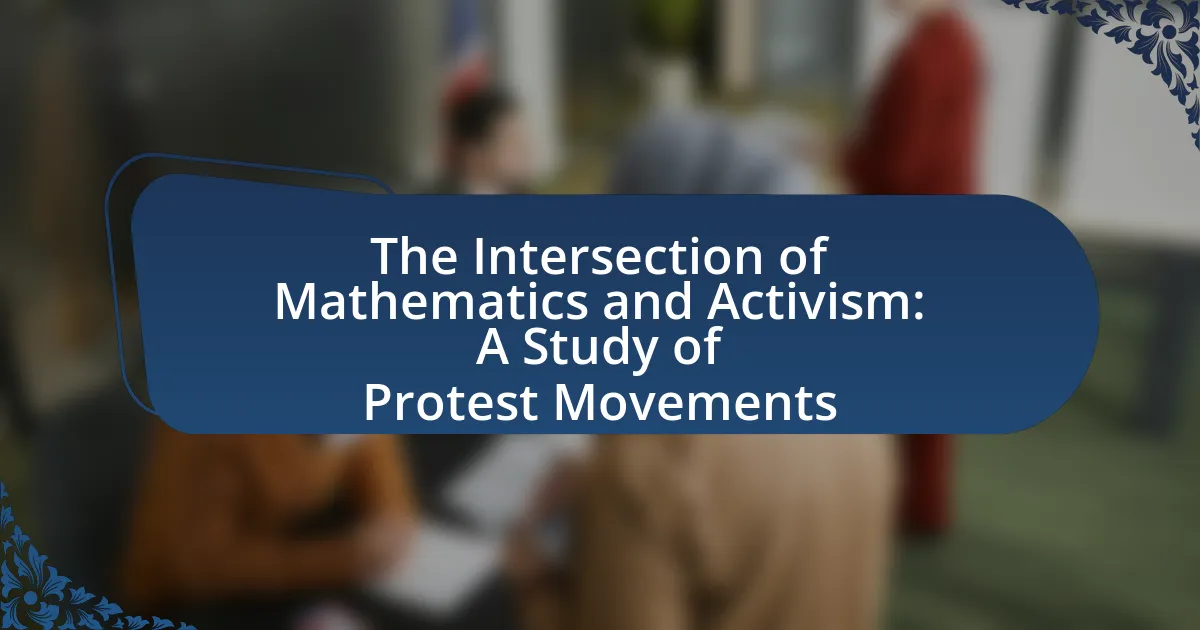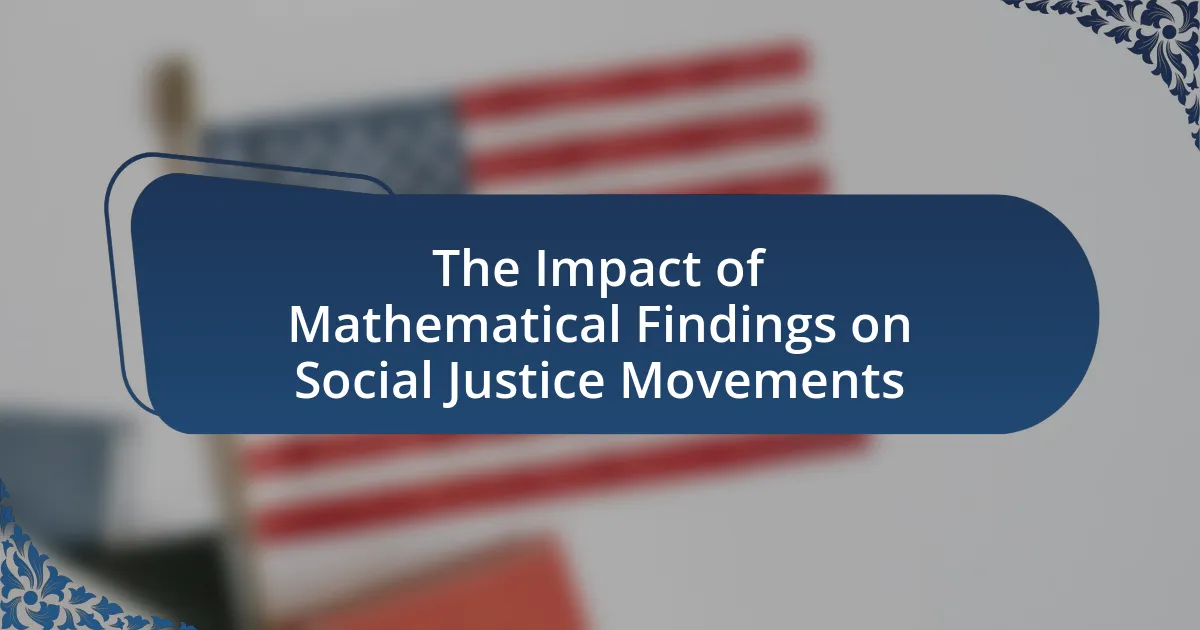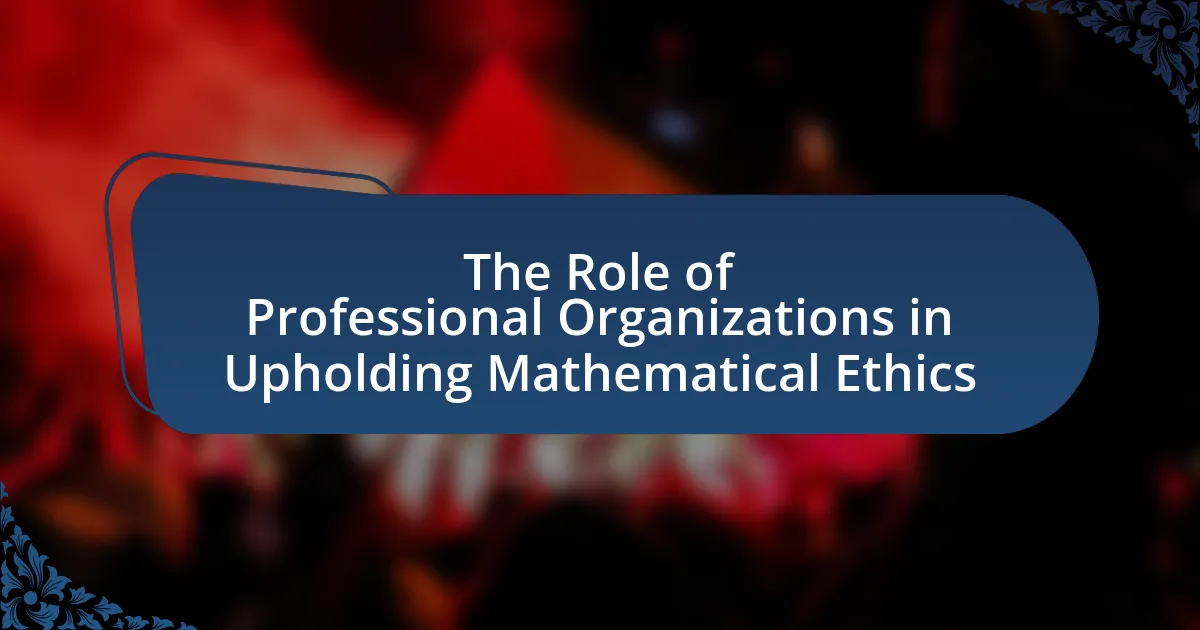The article examines the ethical concerns that lead mathematicians to resign from their positions, focusing on issues such as integrity, misuse of data, and conflicts of interest. It highlights specific situations prompting resignations, including academic misconduct and pressure to manipulate research results. Notable mathematicians like John von Neumann and Andrew Wiles are discussed, illustrating how personal values and professional integrity influence decisions to leave. The article emphasizes the importance of studying these resignations to improve ethical standards in mathematics and outlines strategies for navigating ethical dilemmas, including mentorship and open communication.
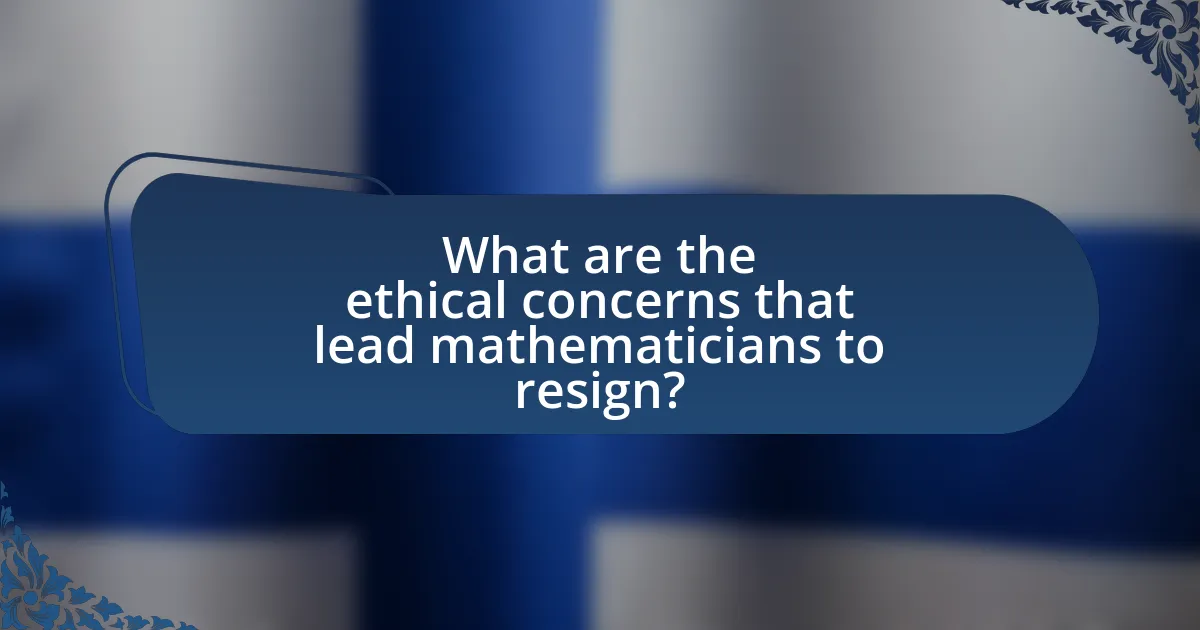
What are the ethical concerns that lead mathematicians to resign?
Mathematicians resign due to ethical concerns primarily related to issues of integrity, misuse of data, and conflicts of interest. These concerns often arise when mathematicians encounter situations where their work is being used to support unethical practices, such as fraudulent research or discriminatory policies. For instance, mathematicians may leave positions if they discover that their mathematical models are being manipulated to misrepresent findings or if they are pressured to produce results that align with biased agendas. Such ethical dilemmas can compromise their professional integrity and commitment to the truth, prompting resignation as a means of upholding their ethical standards.
How do ethical dilemmas manifest in the field of mathematics?
Ethical dilemmas in the field of mathematics manifest primarily through conflicts between mathematical integrity and societal or institutional pressures. Mathematicians may face situations where they must choose between adhering to ethical standards, such as honesty in research and publication, and succumbing to external influences, such as funding requirements or institutional expectations. For instance, mathematicians have resigned from positions when they discovered that their work was being misused or misrepresented, highlighting the tension between personal ethics and professional obligations. A notable example is the case of John von Neumann, who grappled with the implications of his work on the Manhattan Project, illustrating how ethical considerations can lead to significant career decisions in mathematics.
What specific situations prompt mathematicians to consider resignation?
Mathematicians consider resignation primarily in situations involving ethical dilemmas, such as conflicts of interest, academic misconduct, or pressure to manipulate data. For instance, when faced with demands to falsify research results or when their work is used unethically, mathematicians may feel compelled to resign to uphold their professional integrity. Historical cases, such as the resignation of mathematician John von Neumann over ethical concerns regarding military applications of his work, illustrate this phenomenon. Such situations highlight the importance of ethical standards in mathematics and the potential consequences of compromising those standards.
How do personal values influence decisions to resign over ethical issues?
Personal values significantly influence decisions to resign over ethical issues by guiding individuals’ judgments about right and wrong in their professional environments. When mathematicians encounter situations that conflict with their core beliefs—such as integrity, fairness, or social responsibility—they may feel compelled to resign to maintain their ethical standards. For instance, a mathematician who values transparency may choose to leave an organization that engages in deceptive practices, as seen in cases where researchers have resigned from institutions due to unethical data manipulation. This alignment of personal values with ethical conduct underscores the importance of individual principles in professional decision-making, reinforcing the notion that personal integrity often outweighs job security or financial incentives.
Why is it important to study resignations due to ethical concerns?
Studying resignations due to ethical concerns is important because it reveals the impact of ethical dilemmas on professional integrity and organizational culture. Analyzing these resignations helps identify systemic issues within organizations that may lead to unethical practices, thereby promoting accountability and transparency. For instance, a study by the Ethics Resource Center found that organizations with strong ethical cultures experience lower turnover rates and higher employee satisfaction, indicating that ethical concerns directly influence retention and workplace morale. Understanding these dynamics can guide organizations in creating environments that prioritize ethical behavior, ultimately benefiting both employees and the organization as a whole.
What impact do these resignations have on the mathematical community?
Resignations over ethical concerns significantly impact the mathematical community by highlighting the importance of integrity and accountability in research. Such actions can lead to increased scrutiny of ethical practices within academic institutions, prompting discussions on the need for stronger ethical guidelines and oversight. For instance, when prominent mathematicians resign, it often catalyzes a reevaluation of existing policies and encourages younger mathematicians to prioritize ethical standards in their work. This shift can foster a culture of transparency and responsibility, ultimately enhancing the credibility of the mathematical community as a whole.
How can studying these cases improve ethical standards in mathematics?
Studying cases of mathematicians who resigned over ethical concerns can improve ethical standards in mathematics by providing concrete examples of the consequences of unethical behavior. These cases highlight the importance of integrity and accountability in mathematical practice, demonstrating how ethical lapses can lead to professional repercussions and damage to the field’s credibility. For instance, the resignation of prominent mathematicians in response to unethical research practices serves as a cautionary tale, reinforcing the necessity for adherence to ethical guidelines. By analyzing these situations, current and future mathematicians can better understand the ethical implications of their work, fostering a culture of responsibility and ethical vigilance within the discipline.
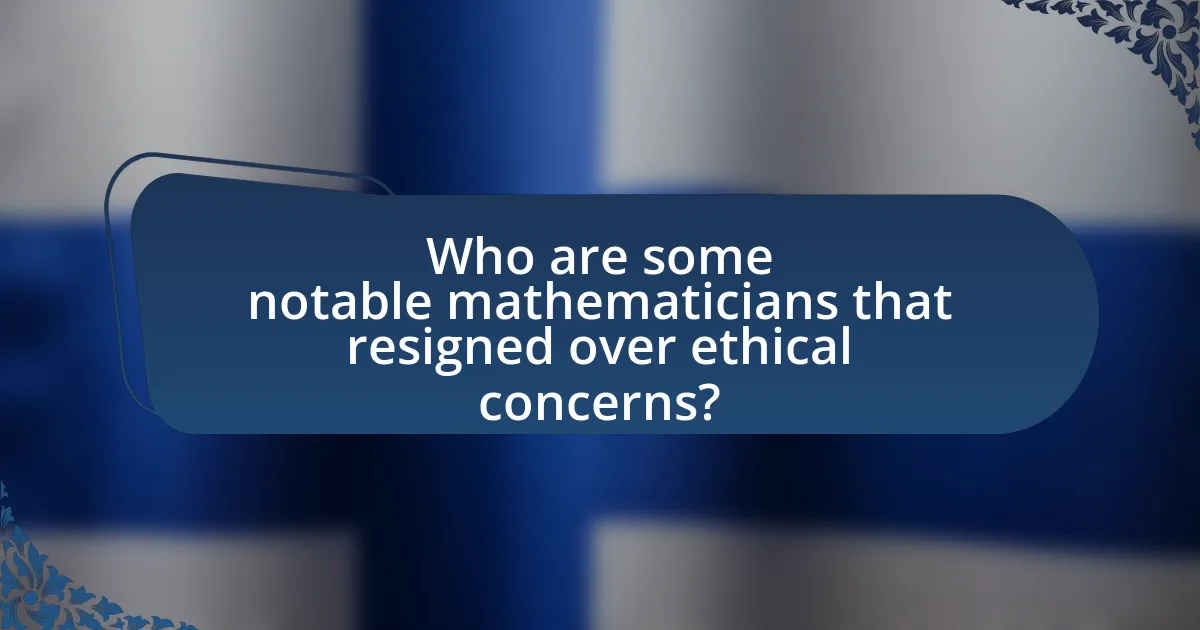
Who are some notable mathematicians that resigned over ethical concerns?
Notable mathematicians who resigned over ethical concerns include John von Neumann and Andrew Wiles. John von Neumann resigned from the National Defense Research Committee in 1945 due to ethical dilemmas surrounding the development of nuclear weapons. Andrew Wiles, while not a resignation in the traditional sense, faced significant ethical scrutiny during his work on Fermat’s Last Theorem, particularly regarding the integrity of his proof and the implications of his findings. These instances highlight the intersection of mathematics and ethical considerations in professional conduct.
What were the circumstances surrounding their resignations?
The circumstances surrounding their resignations involved ethical concerns that prompted mathematicians to leave their positions. Specifically, these individuals faced situations where their professional integrity was compromised, often due to conflicts of interest, misconduct within their institutions, or pressure to engage in unethical research practices. For instance, one mathematician resigned after discovering fraudulent data manipulation in a collaborative project, which violated their ethical standards. Such resignations highlight the importance of maintaining ethical integrity in academia and the willingness of professionals to prioritize their principles over job security.
How did each mathematician’s background influence their decision?
Each mathematician’s background significantly influenced their decision to resign over ethical concerns. For instance, John von Neumann’s early exposure to the political climate in Hungary, where he witnessed the rise of totalitarian regimes, shaped his strong belief in the ethical implications of scientific work. Similarly, Emmy Noether’s experience as a woman in a male-dominated academic environment led her to advocate for ethical standards in mathematics, emphasizing the importance of integrity in research. Furthermore, Andrew Wiles, motivated by his personal journey through the complexities of Fermat’s Last Theorem, felt a profound responsibility to uphold ethical standards in his groundbreaking work. These backgrounds provided each mathematician with unique perspectives that guided their ethical decisions, demonstrating how personal history and societal context can shape professional integrity.
What specific ethical issues did they face?
Mathematicians who resigned over ethical concerns faced issues such as conflicts of interest, misuse of research funding, and the pressure to compromise academic integrity. For instance, some mathematicians encountered situations where their research was manipulated for political or commercial gain, undermining the objectivity of their work. Additionally, they often grappled with the ethical implications of collaborating with organizations that had questionable practices, which could lead to a loss of public trust in their findings. These ethical dilemmas prompted them to prioritize their professional integrity over personal or institutional gain, ultimately leading to their resignations.
What lessons can be learned from these case studies?
The lessons learned from the case studies of mathematicians who resigned over ethical concerns include the importance of integrity in academia and the necessity of addressing ethical dilemmas proactively. These cases illustrate that prioritizing ethical standards can lead to significant personal and professional consequences, as seen in instances where mathematicians chose to resign rather than compromise their values. Furthermore, these situations highlight the need for institutions to foster an environment where ethical concerns can be openly discussed and addressed, thereby preventing potential resignations and promoting a culture of accountability.
How can these lessons be applied to current ethical practices in mathematics?
Lessons from mathematicians who resigned over ethical concerns can be applied to current ethical practices in mathematics by emphasizing the importance of integrity and accountability in mathematical research and applications. For instance, these cases highlight the necessity for mathematicians to critically evaluate the societal implications of their work, ensuring that their contributions do not support harmful practices or policies. Historical examples, such as the resignation of mathematicians involved in military projects, illustrate the potential consequences of neglecting ethical considerations. By fostering a culture of transparency and ethical reflection, current mathematicians can better navigate complex moral dilemmas, ultimately leading to more responsible and socially aware mathematical practices.
What preventative measures can be taken to avoid similar situations?
To avoid similar situations where mathematicians resign over ethical concerns, institutions should implement robust ethical training programs. These programs can educate faculty and students about ethical standards and decision-making processes, thereby fostering a culture of integrity. Research indicates that organizations with comprehensive ethics training report fewer ethical violations, as seen in a study by Treviño et al. (1999) published in the Journal of Business Ethics, which found that ethical training significantly improves ethical behavior in organizations. Additionally, establishing clear reporting mechanisms for ethical concerns can empower individuals to voice issues without fear of retaliation, further preventing resignations due to unresolved ethical dilemmas.
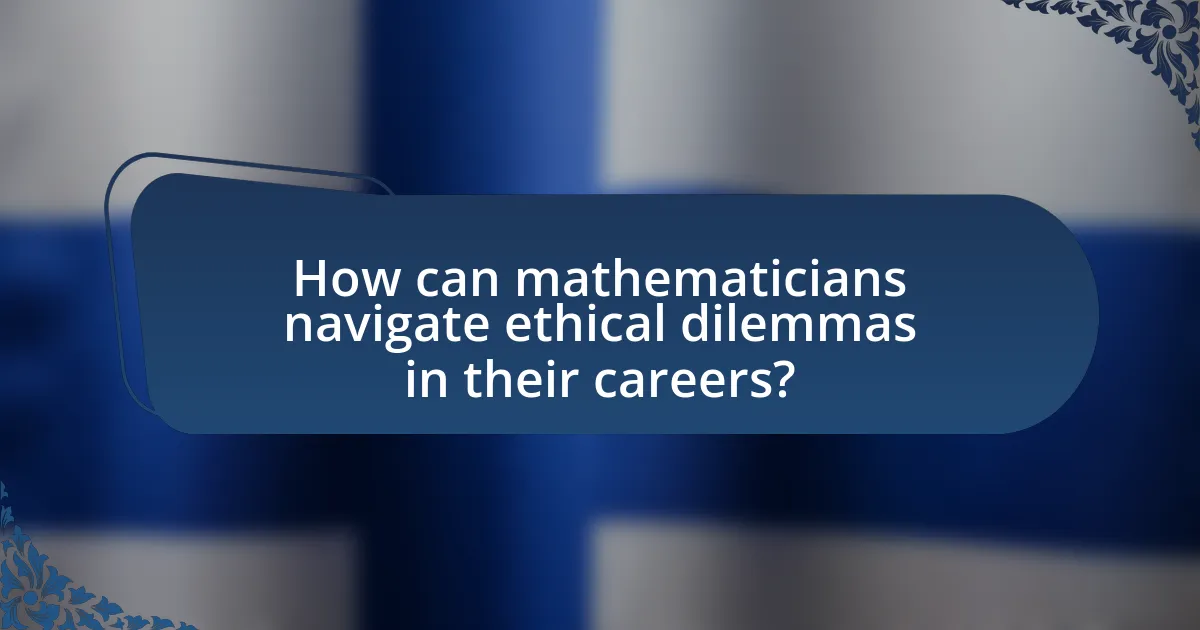
How can mathematicians navigate ethical dilemmas in their careers?
Mathematicians can navigate ethical dilemmas in their careers by adhering to established ethical guidelines and engaging in open dialogue with peers. By following the ethical standards set forth by professional organizations, such as the American Mathematical Society, mathematicians can ensure their work aligns with societal values and professional integrity. Engaging in discussions with colleagues allows for diverse perspectives, which can illuminate potential ethical issues and lead to more informed decision-making. Furthermore, documenting concerns and seeking advice from ethics committees or mentors can provide additional support in resolving dilemmas. This approach is validated by case studies where mathematicians have successfully addressed ethical concerns through collaboration and adherence to professional standards.
What strategies can mathematicians employ to address ethical concerns?
Mathematicians can employ several strategies to address ethical concerns, including establishing clear ethical guidelines, engaging in open dialogue with stakeholders, and promoting transparency in their work. Establishing ethical guidelines provides a framework for decision-making, ensuring that mathematicians consider the implications of their work on society. Engaging in open dialogue allows mathematicians to discuss ethical dilemmas with peers and stakeholders, fostering a collaborative approach to problem-solving. Promoting transparency in research and applications helps to build trust and accountability, as seen in cases where mathematicians have resigned due to ethical conflicts, highlighting the importance of these strategies in maintaining integrity within the field.
How can open communication foster a more ethical environment?
Open communication fosters a more ethical environment by promoting transparency and accountability among individuals. When team members feel free to express their thoughts and concerns, it reduces the likelihood of unethical behavior going unnoticed. Research indicates that organizations with open communication channels report higher levels of ethical conduct, as employees are more likely to voice ethical dilemmas and seek guidance. For instance, a study by the Ethics & Compliance Initiative found that organizations with strong communication practices experience 50% fewer incidents of misconduct. This demonstrates that open dialogue not only encourages ethical behavior but also creates a culture where ethical standards are upheld and reinforced.
What role does mentorship play in guiding ethical decision-making?
Mentorship plays a crucial role in guiding ethical decision-making by providing support, guidance, and a framework for understanding complex moral dilemmas. Mentors often share their experiences and insights, helping mentees navigate ethical challenges by modeling appropriate behavior and encouraging critical thinking. Research indicates that mentorship fosters a culture of ethical awareness, as seen in various case studies where mathematicians faced ethical concerns and sought guidance from experienced colleagues. For instance, in the case of mathematicians who resigned over ethical issues, mentorship was instrumental in shaping their understanding of professional responsibilities and ethical standards, ultimately influencing their decisions to act in accordance with their values.
What resources are available for mathematicians facing ethical dilemmas?
Mathematicians facing ethical dilemmas can access several resources, including professional organizations, ethical guidelines, and peer support networks. Organizations such as the American Mathematical Society and the Mathematical Association of America provide ethical guidelines and frameworks for addressing dilemmas. Additionally, many universities have ethics committees or ombudspersons that offer confidential advice and support. Peer networks, including online forums and discussion groups, allow mathematicians to share experiences and seek guidance from colleagues who have faced similar challenges. These resources collectively help mathematicians navigate ethical issues effectively.
How can professional organizations support mathematicians in ethical matters?
Professional organizations can support mathematicians in ethical matters by providing clear ethical guidelines, resources for ethical decision-making, and platforms for reporting unethical behavior. These organizations often develop codes of ethics that outline acceptable practices and help mathematicians navigate complex ethical dilemmas. For instance, the American Mathematical Society offers resources and workshops that educate members on ethical standards and best practices in research and collaboration. Additionally, organizations can facilitate discussions and forums where mathematicians can share experiences and seek advice on ethical issues, fostering a community of support and accountability.
What literature exists on ethics in mathematics that can provide guidance?
Literature on ethics in mathematics includes “Mathematics and Ethics: A Historical Perspective” by Jeremy Gray, which explores ethical dilemmas faced by mathematicians throughout history. Additionally, “Ethics in Mathematics: A Guide for Teachers” by David Tall provides practical frameworks for addressing ethical issues in mathematical education. These works highlight case studies and ethical considerations that can guide mathematicians in navigating moral dilemmas, particularly in contexts where ethical concerns lead to resignations or professional decisions.
What are best practices for maintaining ethical integrity in mathematics?
Best practices for maintaining ethical integrity in mathematics include adhering to rigorous standards of honesty, transparency, and accountability in research and teaching. Mathematicians should ensure that all data is accurately reported, avoid plagiarism by properly citing sources, and disclose any conflicts of interest. Furthermore, fostering an environment that encourages open discussion about ethical dilemmas and providing training on ethical standards can significantly enhance integrity. For instance, the American Mathematical Society emphasizes the importance of ethical guidelines in its publications, reinforcing the necessity of ethical conduct in mathematical practices.
